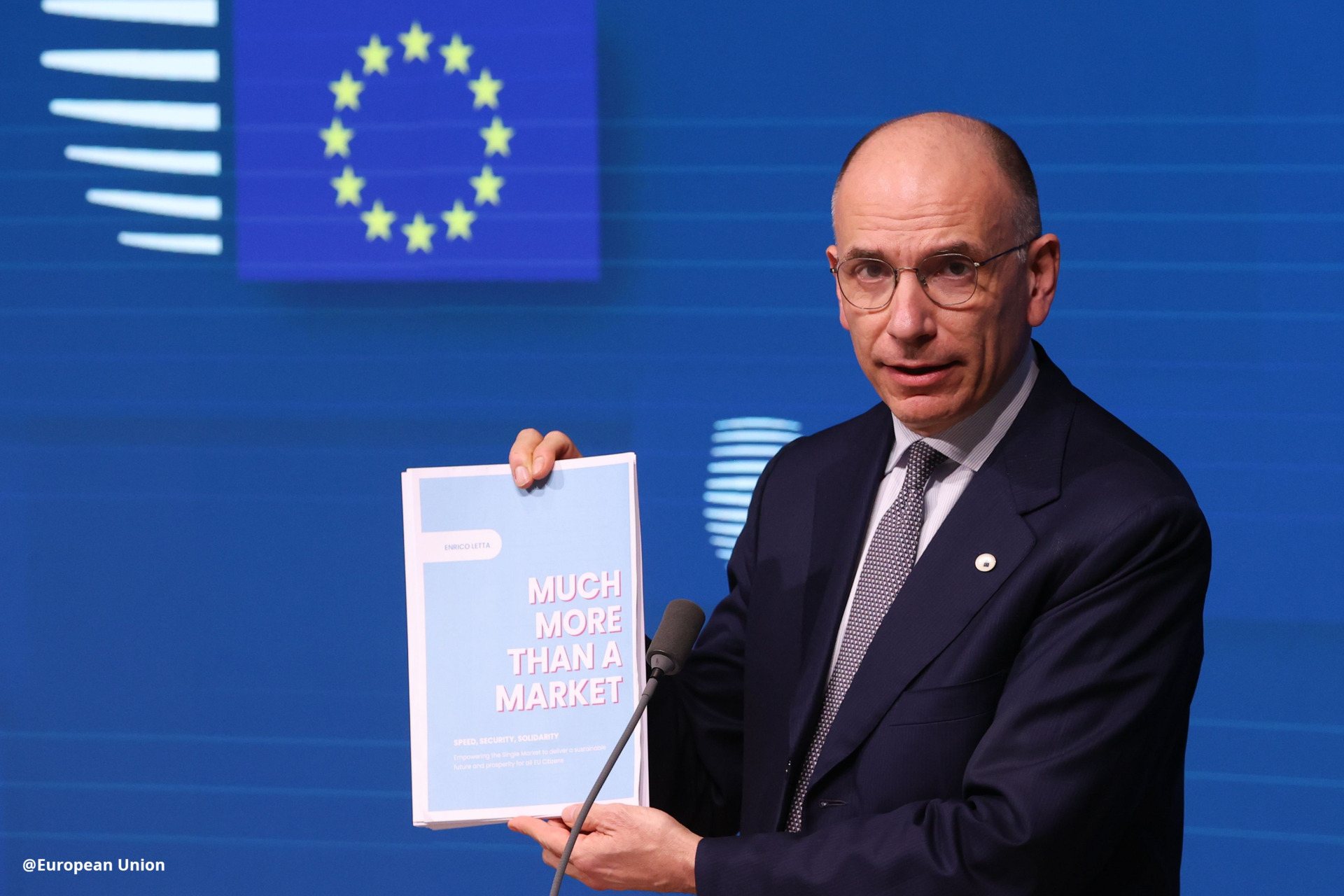
On 18 April 2024, former Italian Prime Minister and President of the Jacques Delors Institut Enrico Letta unveiled his report on the future of the European Union’s Single Market during a European Council meeting. Titled “Much more than a market—Speed, security, solidarity: Empowering the Single Market to deliver a sustainable future and prosperity for all EU Citizens,” the publication was commissioned by EU heads of state to shed light on how to propel the single market forward at a time when competitiveness is taking centre stage in Brussels.
The report is wide-ranging, covering timely issues from health to digital and transport, and results from a long dialogue with national governments, European institutions, candidate countries, social partners, civil society groups, and think tanks. It argues that while the single market remains a cornerstone of the EU, a "new" version needs to be developed to adapt to today’s geopolitical situation and better incorporate finance, electronic communications, and energy – all dimensions that were not initially part of it.
Proposing concrete roadmaps for the 2024-2029 period, the report identifies several ways of enhancing competitiveness and mobilising investments to boost European industrial capacities and accomplish a fair, green, and digital transition while maintaining the single market’s influence on the global stage. One of the central suggestions of the report is to include a fifth freedom – the freedom of enhancing research, innovation, and education - within the single market, which until now exclusively covered the free movement of people, goods, services, and capital. This would foster an ecosystem where knowledge diffusion would become a new norm, with research and innovation (R&I) truly embedded in the single market. This fifth freedom is presented as key to harnessing the power of technology and building leading industrial ecosystems and strong infrastructure in Europe.
More precisely, Letta proposes the creation of a “European Knowledge Commons”, a centralised platform providing access to public research, educational resources, and datasets, a crucial step to harmonise data sharing and interoperability at a cross-border level. He also recommends further deploying public-private partnerships and expanding mobility programmes for researchers, innovators, and students. The report furthermore calls for continued efforts to improve the research ecosystem, retain talents, enhance digital skills, simplify bureaucracy, expand the use of regulatory sandboxes, and promote open science.
Throughout the publication, addressing investment gaps emerges as a crucial challenge, and research and innovation make no exception. The green transition also appears to be a key area in which fostering integration and rapidly leveraging public and private resources are fundamental. Letta thus calls for the unification of state aid and subsidies on the European level, citing Important Projects of Common European Interest (IPCEI) as a positive example and highlighting public and innovation procurement as important instruments to propel the green and digital transformations forward.
When it comes to the energy markets specifically, the publication underlines the need to merge and integrate them further by fostering trust between member states. While the markets withstood the 2022 crisis, continent-scale integration is the only way to ensure the deployment of new clean energy generation capacities quickly and cost-effectively. In order to create such a supportive ecosystem, Letta proposes to create a “Clean Energy Delivery Agency”, a single executive entity managing EU clean energy funding, and building on CINEA, the current European Climate, Environment and Infrastructure Executive Agency, as well as the creation of a “Clean Energy Deployment Fund”.
Amongst the clean energy transition’s objectives, the study identifies several areas requiring priority action across the bloc, namely offshore wind, grid connections, and the hydrogen network. Beyond Europe’s borders, the report recommends boosting cooperation with reliable partners – including neighbouring and African countries – notably to ensure a smooth entry into force of the Carbon Border Adjustment Mechanism (CBAM).
The extent to which the report will be used in future policymaking by the incoming European Commission and Parliament is yet unknown. Indeed, while Letta calls on the European Commission to draft a comprehensive Single Market Strategy and to set up a permanent citizens’ conference to support the follow-up to the report, it will first be assessed by EU leaders, who will then weigh in on how the Commission and Parliament could turn some of the publication’s ideas into concrete actions. Besides, another significant study from Mario Draghi, another former Italian Prime Minister, and on the closely related topic of competitiveness is still expected later this year.